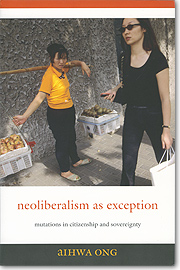Berkeleyan
Publications
19 July 2006
Neoliberalism as Exception: Mutations in Citizenship and Sovereignty
By Aihwa Ong
Duke University Press 2006; 304 pages![]()
To its Western critics, "neoliberalism" calls to mind the worst of free-market capitalism: Ronald Reagan's "trickle-down" economics, the World Trade Organization, globalization, and a tilt toward multinational corporations and against democratic rights, unionism, environmentalism, and other popular liberal causes. Less familiar than its cousin neoconservatism, neoliberalism's most fervent U.S. advocates - with notable exceptions, such as Bill Clinton, who lobbied hard for NAFTA - tend to be political conservatives. Beyond America's borders, however, and particularly in transitional Asian nations, "neoliberal exceptions" are in full flourish.
 |
"Neoliberalism is often discussed as as an economic doctrine with a negative relation to state power, a market ideology that seeks to limit the scope and activity of governing," writes Berkeley's Aihwa Ong, a professor of anthropology and former chair of the Center for Southeast Asia Studies, in this new collection of essays. "But neoliberalism can also be conceptualized as a new relationship between government and knowledge through which governing activities are recast as nonpolitical and nonideological problems that need technical solutions."
This notion of neoliberalism stands in sharp relief to that associated with George W. Bush, who, Ong observes, "has proposed to dismantle fundamental aspects of American liberal democracy institutionalized since the New Deal, from the privatization of Social Security and health care to the abolition of the progressive tax code." In response, "close to half the citizenry has opposed such policies of privatization," with protest movements vowing "to continue the fight to protect individual liberty and the national patrimony." Such battles, she writes, have become "the problem-space of American citizenship, with outcomes as yet unknown." But American neoliberalism is merely one brand. In countries as economically disparate as China, Malaysia, and Singapore, a variety of neoliberal strategies are now being adopted to better compete in the global marketplace.
Ong, who grew up in Malaysia, brings a fresh, decidedly non-Western perspective to the question of neoliberalism's role in East and Southeast Asia, with an emphasis "on the active, interventionist aspect of neoliberalism" across a spectrum of emerging countries, from liberal democracies to authoritarian regimes. In fact, as USC's Manuel Castells puts it, her new book "clearly documents the fact that governments and institutions have a more decisive role than markets in the successful experiences of development in the new global economy."
- Barry Bergman

